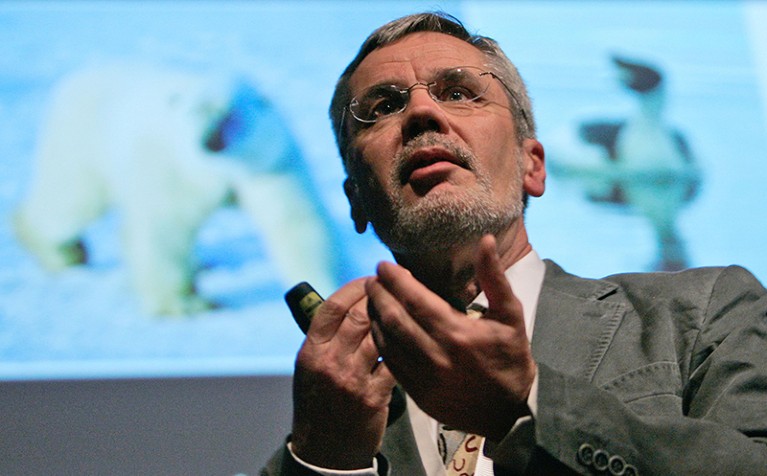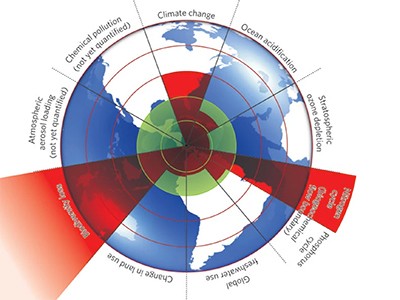
Credit: Alex Hofford/EPA/Shutterstock
Will Steffen was a driving force in Earth-system science as it emerged in the 1980s and 1990s, bringing together disparate fields such as ecology, biology, oceanography and climate science. He was an influential mentor and a passionate public advocate of science-based climate-change policy, speaking truth to power in his adopted home of Australia and worldwide. He has died, aged 75.
Steffen was born in Norfolk, Nebraska, in 1947. Having trained in chemical engineering at what was then the University of Missouri in Rolla and in chemistry at the University of Florida in Gainesville, he emigrated to Australia in the late 1970s to take up a postdoctoral fellowship in X-ray crystallography at the Australian National University in Canberra. He later moved to the Commonwealth Scientific and Industrial Research Organisation (CSIRO), also in Canberra, to work in science management, editing and communication.
Steffen’s passion for science and his exemplary people skills led to him being headhunted for the International Geosphere–Biosphere Programme (IGBP), which aimed at understanding the physical, chemical and biological processes that regulate the whole Earth system. He eventually served as the IGBP’s executive director from 1998 to 2004.
A safe operating space for humanity
He was attracted to tackling complex problems in an interdisciplinary way, and with Earth-system science he blossomed as a researcher. Many ideas that he developed and popularized were at first considered radical but are now mainstream. These include the ‘Great Acceleration’1, which describes the dramatic increase in human environmental impact since the 1950s, brought about by population growth and fossil-fuel burning. He was also a significant advocate of the Anthropocene, the idea popularized by his colleague, Nobel prizewinner Paul Crutzen, that the planet has entered a new geological epoch because of human activity. Steffen served as the climate-science expert on the Anthropocene Working Group.
Among many seminal publications, Steffen is particularly known for the 2009 Nature paper ‘A safe operating space for humanity’2, which introduced the key conceptual framework of ‘planetary boundaries’. Along with Johan Rockström and colleagues, Steffen identified nine planet-scale processes that regulate Earth-system stability, together with thresholds that, if crossed, could lead to large-scale environmental tipping points. He also led work on Hothouse Earth3, exploring how self-reinforcing feedbacks might push Earth into a regime in which its climate could no longer be stabilized even if greenhouse-gas emissions were substantially reduced.
Steffen was fearless in his advocacy of science and science-based policy, communicating the risks of climate change with sobering clarity. In 2011, he was appointed to the Australian government’s Climate Commission, which was dedicated to deepening public understanding of climate change and its impacts. When the commission was abolished in 2013, Steffen co-founded the Climate Council of Australia to continue the work, funded by public donations.
Humans versus Earth: the quest to define the Anthropocene
In 2016, Steffen publicly challenged the Australian government after it lobbied the United Nations scientific and cultural agency UNESCO to censor all mentions of impacts on the Great Barrier Reef, the Northern Territory’s Kakadu National Park and Tasmania’s forests from its report World Heritage and Tourism in a Changing Climate. He and colleagues also challenged CSIRO’s decision to cut more than 100 climate-science staff. Following international condemnation, the government announced a new CSIRO Climate Science Centre based in Hobart, Tasmania.
Steffen frequently acted as an expert witness in court cases seeking to limit new fossil-fuel developments. In 2022, his evidence helped to block a proposed opencast coal mine in the Galilee Basin in Queensland on the grounds of unacceptable impacts on climate change and human rights, including those of children and First Nations peoples.
Steffen was a kind and generous mentor, and an even-tempered and patient man. But he was scathing in his disdain for “the fossil fuel elite”, writing that “these people have no right to destroy my daughter’s future and that of her generation”. His last major project with the Climate Council, where both of us worked with him, was a report titled Aim High, Go Fast. It provided a damning assessment of the inadequacy of the scale and pace of policy action to meet the climate challenge, and reiterated the concept of a “critical next decade” for action.
An outdoors enthusiast and mountaineer, he hiked with his wife, daughter and friends in the Australian wilderness, climbed mountains all over the world and in 2010 published Himalayan Dreaming, the definitive history of Australian Himalayan climbing. He commented on the similarities between his passions: “When you come off a big climb, you really appreciate the beauty of what’s around you. That’s the buzz you get in science when you solve a big problem and suddenly see how it all fits together.”
Will Steffen epitomized the ethos of a social contract between scientist and society in his pursuit and sharing of knowledge relevant to the grand challenge of climate change. His visionary academic publications represent a track record of which any scientist would be proud, but his even greater legacy is the thousands of people he educated and inspired to work for a better future.

 A safe operating space for humanity
A safe operating space for humanity
 Paul J. Crutzen (1933–2021)
Paul J. Crutzen (1933–2021)
 Humans versus Earth: the quest to define the Anthropocene
Humans versus Earth: the quest to define the Anthropocene
 Climate tipping points — too risky to bet against
Climate tipping points — too risky to bet against




